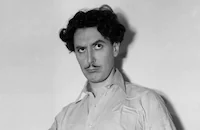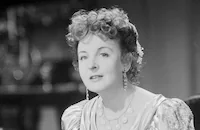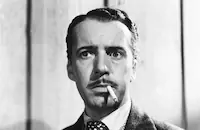Molly and Me

Brief Synopsis
Cast & Crew
Lewis Seiler
Gracie Fields
Monty Woolley
Roddy Mcdowall
Reginald Gardiner
Natalie Schafer
Film Details
Technical Specs

Synopsis
In 1937, actress Molly Barry tires of looking for work on the London stage and applies for a job as a housekeeper, then rushes back to her boardinghouse to prepare for the interview. She tells her fellow actors, including Lily and Julia, about her decision and frets about her lack of references. Just then, Kitty Burroughs, a former exotic dancer who has recently married an upper class newspaper publisher, arrives to visit Molly, her ex-roommate, and Molly persuades her to act as her reference. While Kitty is awaiting her signal from Molly, Peabody, the butler of the Graham household, shows up to interview Molly. Molly convinces Peabody that she is a genuine housekeeper, but Peabody's own true identity is revealed when Kitty recognizes him as Harry Phillips, an actor who left the profession due to his heavy drinking. Molly is overjoyed, as she thinks that Peabody will readily hire another actor, but he refuses, stating that the household can accomodate only one "professional." Desperate for the job, Molly lures Peabody to a pub and gets him drunk, then takes him to the Graham home. In the morning, she presents herself to John Graham, the head of the household, as the new housekeeper, and the hungover Peabody cannot repudiate her without revealing his past. Graham, a stuffy ex-politician, surprises Peabody by accepting Molly and her cheery additions to the house, but the other servants are disgruntled. While Molly is making the best of the situation, Graham consults with his friend, Jamie McDougall, who wants him to stand for Parliament. Graham protests, as his career was ruined years earlier by his scandal-causing, unfaithful wife, but McDougall insists that Graham should return to serve his country. After Graham and Peabody travel to Suffolk to meet with party leaders, Molly discovers that Angus, the gardener, chef Pierre Patard and the other servants are defrauding Graham by ordering too many groceries and selling the garden's flowers. Molly threatens to expose the thieves, but they retaliate by quitting and leaving Molly alone to run the large household. While she is cleaning the fireplace in Graham's study, Molly finds a newspaper clipping about Graham's faithless wife and realizes that she is the cause of Graham's gruff demeanor. That evening, Molly is surprised by the arrival of Jimmy, Graham's teenaged son, who is supposed to be away for his school holidays. Jimmy is ill with a fever, and Molly's kind, motherly behavior prompts the lad to confide in her that his father does not like him. Jimmy, who believes that his mother died while he was very young, thinks that Graham dislikes him because he reminds him of his dead wife. Molly tucks the lad in, and the next morning, receives a telegram from Peabody instructing her to prepare a formal dinner for that evening, when Graham will entertain Sir Arthur Burroughs, the influential publisher of the London Transcript . Desperate for staff, Molly enlists her pals from the boardinghouse, and soon, Lily and Julia are acting as the housemaids, Pops is the butler, Musette is the cook, and Ronnie is working in the garden. Peabody is flabbergasted when he sees the actors in the house, but takes it all in stride. Despite complications, such as the arrival of Kitty, who is married to Sir Arthur, the dinner is a success, and Graham is assured of Sir Arthur's support. The night ends unhappily, however, when Graham overhears Jimmy imitating him while relaxing with Molly and the others in the kitchen. Graham angrily sends Jimmy up to his room, but when he tries to fire Molly, who admits that she and the others are actors, she quits and accuses Graham of being a bad father. The next morning, Jimmy apologizes to his father, and after a long talk, father and son are reconciled and Graham agrees to re-hire Molly and the others. While Graham and Jimmy are upstairs, however, Molly is confronted by Mrs. Graham, who has returned from South Africa, where she moved with her lover years earlier. Mrs. Graham has come back to blackmail her former husband, but Molly sends her off with a promise to bring the money to her hotel. After Graham assures Molly that, with her help, he will become a better father, she is determined to prevent Mrs. Graham from ruining his life again. With the assistance of her friends, Molly tricks Mrs. Graham into believing that she has killed someone, and the frantic woman leaves England without bothering Graham or revealing her presence to Jimmy. Molly and the staff return to the house just before Graham and Jimmy come back from a pleasant evening out, and after Jimmy and the others go to bed, Molly and a reformed Graham enjoy a song and a snack in the cozy kitchen.

Director
Lewis Seiler
Cast

Gracie Fields

Monty Woolley

Roddy Mcdowall

Reginald Gardiner
Natalie Schafer
Edith Barrett
Clifford Brooke
Aminta Dyne

Queenie Leonard

Doris Lloyd
Patrick O'moore
Lewis L. Russell
Ethel Griffies
Eric Wilton
Jean Del Val

Lillian Bronson
David Clyde
Jerry Shane

Boyd Irwin
Ottola Nesmith
Tony Ellis
Walter Tetley
Gordon Richards
Jean Prescott
Ruth Clifford
Nora Cecil
Dorothy Neumann
Shorty, A Dog
Crew
Frank Barnes
John Paul Lock Barton
Robert Bassler
May H. Brahe
Clifford Brooke
Roger Burford
Charles [g.] Clarke
Stanley J. Damerell
Maurice Depackh
Eli Dunn
Tolchard Evans
Harold Fraser-simson
Bernard Freericks
Hugh Gray
Kenneth Green
William E. Haines
Robert Hargreaves
Roger Heman
Albert Hogsett
Gertrude Kingston
R. A. Klune
Lou Kunkel
Thomas Little
Bert Massee
John Mccafferty
A. A. Milne
Cyril J. Mockridge
Emil Newman
Ben Nye
Al Orenbach
Leonard Praskins
Frances C. Richardson
Fred Sersen
Helen Taylor
Vinton Vernon
Lyle Wheeler
Yvonne Wood

Videos
Movie Clip



Film Details
Technical Specs

Articles
Molly and Me
You can guess much of what happens in Molly and Me, but that's beside the point. The pleasure of the film lies in watching the lively but not overly broad performances; the picture is sweet without being maudlin or overcooked. The script was written by Roger Burford and Leonard Praskins, from a slim novella by legendary Hollywood screenwriter Frances Marion, a condensed version of which appeared in Photoplay in 1937. Marion got the idea for the novel from stories she heard from her friend, Marie Dressler, who had sought work as a cook and housekeeper when her career stalled out. MGM, the studio for which Marion worked, bought the script in 1937, and apparently planned to cast singer and entertainer Sophie Tucker in the lead role. But the property languished, until it was bought by 20th Century-Fox in 1937. Fox originally planned to produce the film in England - it's set in 1937 London - but the war intervened, and the project was ultimately made in Hollywood instead.
Fields was an enormously popular entertainer in her native England, first in music halls and then in the cinema, and Molly and Me was one of four features she made when she came to Hollywood in the early 1940s. Fields never felt wholly comfortable in front of the camera, and her face may not have been the prettiest. But she was terrific at playing sensible, good-natured, working-class women - her features have a kind of cheerful openness that's instantaneously likable. Apparently, she was well liked by her colleagues, too. McDowall, later in his career, called her "a woman of extraordinary spirit, courage, stamina and fabric. I worshipped her and stayed friendly with her until she died."
McDowall may have felt a special affinity for Fields because, like her, he was fairly new to Hollywood at the time. He'd made his screen debut in his native England with the 1938 Murder in the Family when he was just nine years old. After making 16 more films in Great Britain, he came to Hollywood by way of New York: While he was living with family friends in Great Plains, his mother, who essentially acted as his manager, contacted an agent who then sent him to MGM to test for The Yearling (1946). McDowall was told he was "too English" for the part, but learned that 20th Century-Fox was looking for a child actor for How Green Was My Valley (1941). William Wyler, attached to the film at the time, was greatly interested in him; when John Ford took the reins of the project, McDowall was cast as Huw, a pivotal character in this deeply moving story about a family in a Welsh mining town. The acclaim he received for the role kicked off a successful run as a child actor in Hollywood. In 1942, he appeared in the Irving Pichel-directed drama The Pied Piper, opposite Monty Woolley. The two would reunite a few years later for Molly and Me, although, as it turns out, Fox also canceled McDowall's contract right after that. "At 17 my childhood career was over," McDowall recalled later. "My agent told me I would never work again, because I'd grown up." His agent, of course, was wrong: After his stint as a child actor, McDowall had a thriving career on the stage, on television, and in film, but Molly and Me nevertheless marks a transition point.
Molly and Me was also the second film Fields made with Woolley: The two had costarred in the 1943 comedy-drama Holy Matrimony. Though Woolley had received a Best Actor Academy Award nomination for The Pied Piper (as well as a nomination for Best Supporting Actor for the 1944 Since You Went Away) he is still perhaps best remembered for his role as the imperious wheelchair-bound critic Sheridan Whiteside in The Man Who Came to Dinner (1942).
Woolley's role in Molly and Me isn't nearly so well-defined, but his whiskery appeal certainly wasn't lost on critics at the time. Even the notoriously stuffy New York Times critic Bosley Crowther had fun watching the film. "Miss Fields and Mr. Woolley are an ideal match and they communicate a spirit of friendliness which goes far toward glossing over a basically banal script," he wrote. Fields' performance tickled him, too: "Miss Fields brings not only an air of great good-will to the screen, but a touch of tender sentiment as she sings Roddy McDowall to sleep with 'Christopher Robin.' For a quiet hour or so of gentle, warming humor Molly and Me serves the purpose nicely." TV trivia fans should also take note: Natalie Schafer, of "Mrs. Howl" fame on "Gilligan's Island," has an amusing bit part as a showgirl-turned-aristocrat, proving that she had lots of practice perfecting that comically posh accent early on.
SOURCES:
IMDb
The New York Times
BFI Screen Online (http://www.screenonline.org.uk/people/id/451952/)
The Independent (UK)
Producer: Robert Bassler
Director: Lewis Seiler
Screenplay: Frances Marion (novel); Roger Burford (adaptation); Leonard Praskins
Cinematography: Charles G. Clarke
Music: Cyril J. Mockridge
Film Editing: John W. McCafferty
Cast: Gracie Fields (Molly Barry), Monty Woolley (John Graham), Roddy McDowall (Jimmy Graham), Reginald Gardiner (Harry Phillips/Peabody the Butler), Natalie Schafer (Kitty Goode-Burroughs), Edith Barrett (Julia), Clifford Brooke (Pops), Aminta Dyne (Musette), Queenie Leonard (Lily)
[black-and-white, 77 minutes]
By Stephanie Zacharek

Molly and Me
Quotes
Trivia
Notes
The working title of this film was Molly, Bless Her. According to the MPAA/PCA Collection at the AMPAS Library, in November 1944, Twentieth Century-Fox considered changing the title to Molly with a Past. Orchestral arranger Maurice DePackh's surname is misspelled "DePachk" in the onscreen credits. A condensed version of Frances Marion's novel was published in Photoplay magazine (5 March 1937).
The following information about the production comes from contemporary news items and the Twentieth Century-Fox Records of the Legal Department and Produced Scripts Collection, located at the UCLA Arts-Special Collections Library: well-known M-G-M screenwriter Frances Marion's novel was based on an incident in the life of her friend, actress Marie Dressler (1869-1934), who briefly worked as a housekeeper and cook during a lull in her stage career. Marion's novel was originally purchased by M-G-M in 1937, and according to a modern source, M-G-M, the studio for which Dressler worked at the height of her film career, intended to star Sophie Tucker in the vehicle. In 1939, Twentieth Century-Fox purchased the rights to Marion's novel, as well as screenplays based on the work, written by Marion, Edward Chodorov and Joseph Fields. It does not appear likely that their screenplays were used for the finished Twentieth Century-Fox production, however.
Twentieth Century-Fox originally intended to produce the film in England, and assigned Roger Burford to write the screenplay, Robert T. Kane to produce and Monty Banks, who was married to star Gracie Fields, to direct. The project was forestalled due to World War II, however, and Burford's screenplay was sent to the United States. Writers Darrell Ware and Karl Tunberg were assigned to the project, but the inclusion of their work in the finished film seems unlikely. According to studio press releases, actors Leyland Hodgson, Matthew Boulton and Leslie Denison were featured in a sequence in which "Molly" and her friends are arrested in the hotel after they trick "Mrs. Graham" into leaving England. The sequence was cut from the released print, however, and those actors do not appear in the picture.














